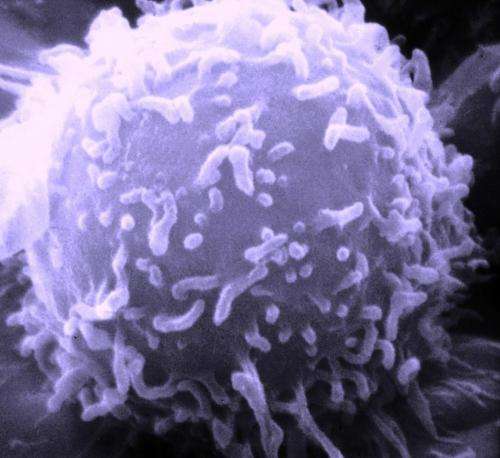Researchers tease apart a pathway certain cancer cells use to replicate

A new "player" in the way certain aggressive cancer cells may reproduce has been identified. It is hoped that these findings may lead to the identification of new cancer targets and may ultimately lead to new therapeutics.
The telomere is a repetitive DNA sequence that caps the ends of each human chromosome and acts as a barrier, protecting the genome. Each time a cell divides, a portion of this barrier is lost and over time our genetic information becomes susceptible to damage. To avoid this type of damage, critically short telomeres send a signal to the cell to induce either growth arrest or cell death.
Cancer cells have mechanisms to overcome progressive telomere shortening and bypass this growth arrest. Cancer cells can maintain their telomere length by producing telomerase or using Alternative Lengthening of Telomeres pathway (ALT). Earlier research suggested the ALT pathway may be activated by replication stress at telomeres.
In this study, which appears in the journal Cell Reports, researchers from Boston University School of Medicine (BUSM) identified that the replication stress response protein SMARCAL1 is a key to the ALT pathway. "Our study suggests that ALT telomeres experience chronic replication stress (a type of DNA damage that is not highly prevalent at 'normal' telomeres) and therefore, rely on SMARCAL1 to resolve this replication stress and maintain telomere stability. In the absence of SMARCAL1, the accumulation of replication stress at ALT telomeres leads to the formation of DNA double strand breaks and consequently, drives massive genomic instability," explained corresponding author Rachel Flynn, PhD, assistant professor of pharmacology and medicine at BUSM.
According to the researchers the ALT pathway is active in approximately 10 percent of all cancers, and especially occurs in aggressive cancers, including osteosarcoma, glioblastoma and a subset of pancreatic tumors, which are often resistant to standard chemotherapeutic strategies. "Identifying new players regulating the ALT pathway may lead to the identification of new targeted therapies for cancers that currently have limited treatment options," added Flynn.
















